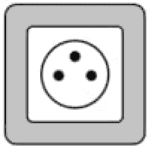Normal 0 false false false EN-US X-NONE X-NONE /* Style Definitions */ table.MsoNormalTable {mso-style-name:"Table Normal"; mso-tstyle-rowband-size:0; mso-tstyle-colband-size:0; mso-style-noshow:yes; mso-style-priority:99; mso-style-parent:""; mso-padding-alt:0in 5.4pt 0in 5.4pt; mso-para-margin:0in; line-height:115%; mso-pagination:widow-orphan; font-size:11.0pt; font-family:"Arial",sans-serif; mso-ansi-language:EN;}
Plug For Niger: What You Need To Know
What is the plug for Niger? Before you travel, check the information below to make sure your electronic devices are compatible with the outlet type and voltage.
Electrical Summary
Niger uses outlet types C, D, E, F at a voltage of 220V and a frequency of 50 Hz.
Plug Compatibility: Type C, Type D, Type E, Type F
Voltage: 220V
Frequency: 50 Hz
Type C

Type D

Type E

Type F

Can North Americans use Electronics in Niger without an Adapter?
No! North Americans will need an adapter for the outlets and a transformer for the voltage when traveling to Niger. North Americans device plugs will not work with the outlet types in Niger. Also, the voltage in Niger is different from North American voltages.
Can Europeans use Electronics in Niger without an adapter?
Yes! Europeans do not need a travel adapter or transformer when traveling to Niger. Most device plugs will work with the outlet types in Niger. Also, the voltage in Niger is the same as in Europe.
What Outlet does Niger Use?
Type C

Type D

Type C plug sockets have two round pins and no grounding pin. These plugs are typically used with devices that have a voltage of 220-240V.
Type D plug sockets have three round pins and a grounding pin. These plugs are typically used with devices that have a voltage of 230V.
Type E

Type F

Type F plug sockets are used in Germany, Spain, Italy and some parts of Africa. They have two round pins and a grounding pin. These plugs are typically used with devices that have a voltage of 230V.
Is it safe to drink water in Niger?
To be on the safe side, you can use common precautions such as boiling tap water for at least one minute, using water purification tablets, or drinking bottled water. It’s also important to note that ice may be made from tap water and that foods may be washed or prepared with tap water.
We recommend always packing a filtered water bottle when traveling:
Travel Essentials
Be sure to check our list of travel essentials before your trip!
Should I get travel insurance when traveling to Niger?
It is generally recommended to get travel insurance when traveling to a different country. Travel insurance can provide financial protection and peace of mind in case of unexpected events, such as medical emergencies, trip cancellations, lost or stolen baggage, or other travel-related mishaps.
Travel insurance can cover various expenses related to your trip, such as medical expenses, emergency medical transportation, trip cancellation or interruption, lost or stolen baggage or personal belongings, and other travel-related expenses.
Before purchasing travel insurance, it’s important to carefully review the policy details, including the coverage limits, exclusions, and any applicable deductibles or copays. You should also make sure that the policy covers any activities or destinations that you plan to participate in or visit during your trip.
Travel Summary
One of the main attractions in Niger is the Agadez region, which is home to the stunning Sahara Desert. Visitors can explore the sand dunes, ride
camels, and visit traditional nomadic villages. The Air Mountains, located in central Niger, are also a popular destination for hiking, birdwatching, and exploring ancient rock paintings.
The capital city of Niamey is a vibrant and bustling city with a lively market, museums, and art galleries. Visitors can also explore the ancient city of Zinder, which was once a hub for trans-Saharan trade and is known for its impressive traditional architecture.
Niger is also home to unique wildlife such as the West African giraffe, cheetahs, and African elephants. The W National Park, located in the southeastern part of the country, is one of the largest parks in West Africa and is home to a variety of wildlife, including antelopes, monkeys, and lions.
The culture of Niger is diverse, with more than 20 different ethnic groups, each with its own traditions and customs. Visitors can experience traditional music, dance, and art, and sample local cuisine such as tuwo, a staple dish made from millet flour.
Overall, Niger offers a unique and unforgettable travel experience for those seeking adventure, culture, and natural beauty.
Traveling to another country? Check out our Countries page for more info.